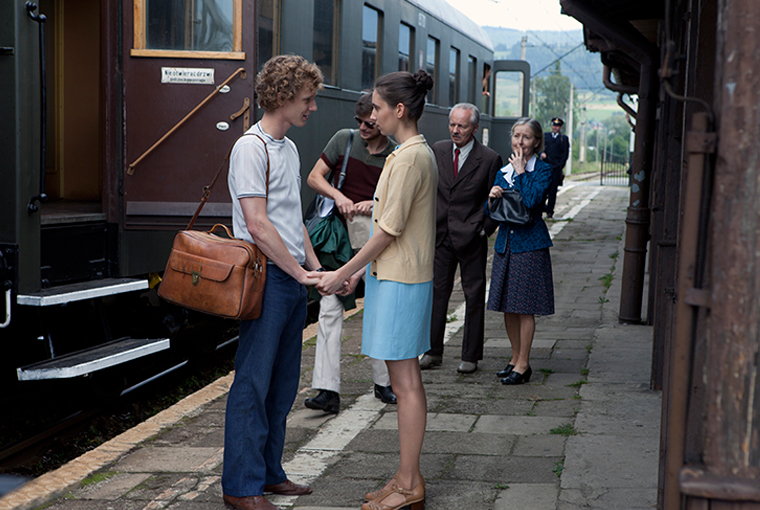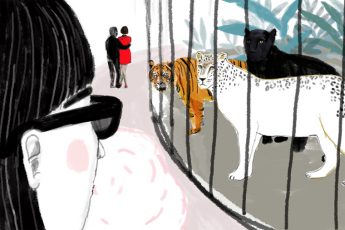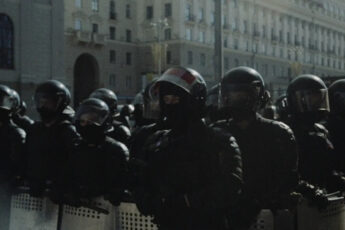Plunging Towards Revisionism
Jacek Bromski’s One Way Ticket to the Moon (Bilet na Księżyc, 2013)
Vol. 41 (May 2014) by Konstanty Kuzma
In Jacek Bromski’s One Way Ticket to the Moon, set in 1969, two brothers travel Poland in search of a fulfillment of their generation’s promise – as Antoni, the older and more experienced of the two, puts it: “The sexual revolution is on, flower power and hippies!” Antoni wants Adam to gain some romantic experience before the shy high-school graduate commences his three-year military service, meanwhile seizing the moment to add some to his own. Their main opponent is an oppressive and over-regulated state, though ironically Adam is a virgin because his girlfriend is religious (such propositional impurities are common in the film, which tends to be ambivalent in spite of its black and white world view). On their road to the seaside, which leads them through rural areas, Cracow and Silesia, we are offered an ad hoc sketch of Poland in the late 1960s: toilets stink, people are poor, and the country’s rife with corruption. That people could still be happy is intimated at most – even in the minds of youngsters, trouble prevails.
Though most Poles (including Bromski) probably associate their country in the late 1960s with shades of gray, the gaudy color correction which is typical for contemporary Polish cinema and films about the ’68 generation spills over in One Way Ticket to the Moon. Before the off-key ending of the film, which throws the story off its course, there is only the sunset and the night – a color palette that stands for the two emotional wavelengths the film operates with: turmoil and tragedy. That these two themes are handled with comedy is likeable, but problematic: subplots and themes, like Adam’s passion for aviation (which makes but for a nice title), are neglected and forgotten. The actors, especially Filip Pławiak (in the role of Adam) and Mateusz Kościukiewicz (Antoni), should be credited with dealing with the erratic narrative relatively well.
The film’s principal weakness is its frivolous handling of a complex period in Poland’s past. In truth, Bromski’s protagonist never runs the risk of encountering moral dilemmas. Conveniently, the discovery of manhood coincides with the discovery of the state’s illegitimacy (until then, Adam is less convinced of the latter than his insolent brother) – the woman to whom he loses his virginity is also harassed by an alcoholic state official. By reaching the narrative goal of the story, Adam thus unveils and imbibes its ideological ones. Still, the film’s message is not that young Poles in the late ’60s rebelled, at least in part, in want of sex, drugs and rock’n’roll. It is that being young always meant being at odds with the system (this, one may add, might have been somewhat convincing had Bromski used drugs or rock’n’roll as his central motive – not sex).
Surely, this is no pattern unique to Poland, or films. In Sonnenallee, a German GDR-comedy from 1999 in which a group of friends is similarly poised between romantic ambitions and state oppression, Micha and his friend Mario turn into quasi-dissidents by imitating their girlfriends-to-be, while most first-person shooters reward the player with narrative denouements that are ideologically inspired (in the US, which has the biggest video game industry in the world, the end of first-person-shooters often connotes “If you win, America wins!”). Problematically, One Way Ticket to the Moon has serious historical ambitions. Rather than predicating things of the Polish youth in 1969, the viewer is told that what he is presented with is in fact the Polish youth in ’69. That the Polish Film Institute supports such projects is both unfortunate and odd. Young viewers not familiar with the People’s Republic will wonder how their grandparents could survive in a country as oppressive as that depicted in Bromski’s film. Moreover, they should inquire how that country itself survived if seemingly everyone in Poland was against it – that is, except for soldiers, high officials and people who were “forced” to collaborate, as one character from the film puts it. To remove such riddles, they must realize that Polish directors love to generalize, turning parts into wholes. Thus, the fact that Poland was hostile towards the Nazi occupation is often translated as meaning that everybody in Poland actively resisted it (other films, like In Darkness, illustrate the incremental moral wakening of former antisemites). On the other hand, One Way Ticket to the Moon is indeed informative in revealing how Poles, including Bromski, like to remember their past; characters from Polish films seem to forebode which course their history will take: usually, they act in line with the way we would like them to have acted from today’s perspective.




Leave a Comment